Navigating the complexities of breaking a lease can feel like being lost at sea, with the contract as your compass.
A lease, it’s not just a document—it’s a binding commitment, a set of rules that outlines the specifics of your tenancy, like the length of your stay, the exact rent amount, and even pet policies.
Think of it as the blueprint for your living situation, with details you can’t afford to ignore, for example, the early termination clause, that may detail the financial repercussions of ending it early, or the subletting clause that may allow you to pass on the lease to a new tenant, it’s a game of chess that you have to understand.
Many leases, about 60%, have an early termination clause, and if you don’t read it, you might face penalties like a flat fee or covering rent for the remainder of your term, which could be substantial.
This isn’t about avoiding problems, it’s about understanding the rules.
Lease terms vary widely, from a few short paragraphs, to lengthy multi-page documents, but they typically cover several core aspects, like:
- The duration of your lease, whether a 6-month short term or a multi-year commitment.
- The precise amount of rent, when it’s due, and the accepted payment method.
- The rules and regulations related to pets, if they are even allowed, and associated fees or restrictions.
- Specific maintenance responsibilities for the tenant and the landlord, who’s on the hook when things break.
Diving into the specifics of your lease, you need to scrutinize clauses like the security deposit, to fully understand the conditions for its return or the cases where it can be withheld, you’ll need to find the section that talks about lease renewal options, and be prepared to act on time to avoid unwanted renewals or a month-to-month situation, also watch out for clauses related to the landlord’s access to the unit, which should specify the reasons why they can enter and the proper notice they need to give you. It’s all in the details.
Now, sometimes life throws curveballs, the unexpected that make it impossible to stay in place.
About 15% of tenants find themselves in situations where they need to break their lease for unavoidable reasons, and that’s where understanding your rights becomes crucial, reasons like:
- Military deployment or a permanent change of station, which are protected by The Servicemembers Civil Relief Act.
- Uninhabitable conditions that make it unsafe or unhealthy for you to live there, which could include, structural issues, serious mold problems, infestations, or lack of utilities.
- Domestic violence situations, which allow for early termination without penalties in many states, it requires you to have documentation, like police reports, or restraining orders.
- Landlord violations of the lease terms, including illegal entries to your unit, neglect to do necessary repairs, or any type of discrimination.
If you find yourself needing to break your lease, don’t think of it as an immediate end, try to negotiate.
Open communication can often lead to a mutual agreement.
More than 40% of tenants are able to avoid severe penalties through this approach. There are several ways to try:
- A lease buyout, where you offer the landlord a lump sum, and this could be a percentage of the remaining rent.
- Finding a suitable replacement tenant, which can be facilitated by advertising online.
- Always document everything in writing, no matter what you agree, this is for your protection and for the landlord’s.
Remember, there are financial consequences that should not be taken lightly.
The loss of the security deposit is just the first one, you might have to continue to pay rent, or you will have to pay early termination fees.
If the situation gets out of control it could impact your credit and end in court, which should be avoided at all costs.
Understanding the potential impact on your credit score is critical.
About 30% of tenants breaking their lease experience a negative hit to their credit, affecting their ability to rent in the future. The best option is always to try to negotiate.
Tenants have rights.
Learn what the law says about it in your city, and get familiar with the Fair Housing Act to avoid discrimination.
When in doubt, seek legal counsel, and make sure you are aware of eviction laws and processes so you can be prepared in any kind of situation.
If you can’t negotiate your way out, subleasing might be an option, it could help you fulfill your obligations under the lease, but remember you will be responsible if any problems arise, so screen your subtenant carefully.
And if subleasing is not an option, a lease transfer may be the better alternative.
Understanding Your Lease Agreement
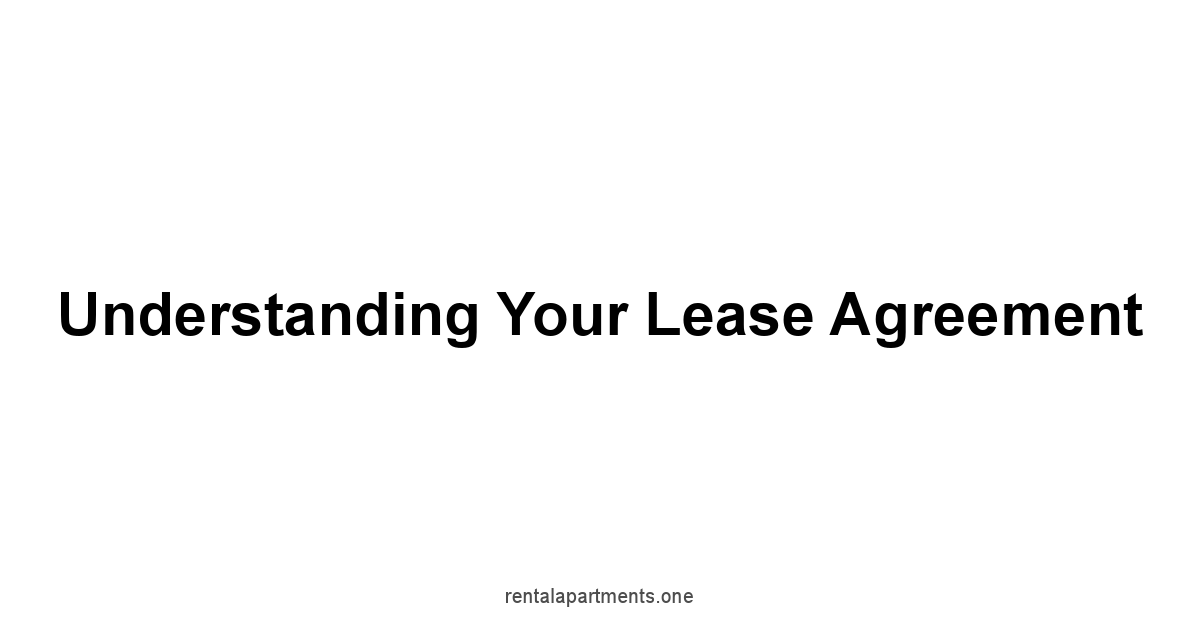
A lease agreement, it’s the deal you make with your landlord, that piece of paper you signed when you moved in.
It’s more than just a formality, it’s a binding contract, a set of rules both you and the landlord agree to play by for a specific period.
Before you consider breaking it, you need to know it inside and out, every clause and every condition.
It’s about understanding your obligations and your rights.
A quick read-through won’t cut it, you’ve got to know the details.
Knowing your lease, understanding the language and the commitments it entails, is the foundation for any decision about ending it early.
It’s the blueprint for your tenancy, outlining the rules of the game.
Ignoring it or glossing over the details can lead to trouble down the line, legal and financial.
So, before you even think about packing, you need to get intimately familiar with this contract.
Lease Terms and Conditions
Leases aren’t all the same, they come in different shapes and sizes. Some are short and sweet, others long and detailed.
A typical lease will outline several key aspects of your tenancy.
For instance, it will specify the duration of your stay, usually in months or years.
It’ll state the exact rent amount, when it’s due, and how it should be paid.
It might list late fees, rules about pets, and guest policies.
This section is where you learn the duration of your commitment.
The terms section of your lease will also specify how often rent increases are permitted, and the notice period for such increases.
It often details maintenance responsibilities, both yours and the landlord’s.
This section usually includes clauses about property usage such as noise levels, use of common areas, and any restrictions on renovations or alterations you may want to make to the property. These are the everyday rules you agree to live by.
Pay close attention, this section is crucial for understanding the rules.
- Lease Duration: Often a 6-month, 12-month, or multi-year term.
- Rent Amount: Specifies the monthly or periodic payment due.
- Payment Method: Details how and when rent must be paid.
- Late Fees: States penalties for late payments.
- Pet Policies: Dictates whether pets are allowed, and any associated fees or restrictions.
- Maintenance Responsibilities: Outlines who is responsible for repairs.
- Guest Policy Specifies the rules regarding having guests, and for how long they are allowed to stay.
Key Clauses to Look For
Within your lease, certain clauses can significantly impact your situation if you’re considering breaking it.
One to pay attention to is the early termination clause.
This clause outlines the conditions under which you can end your lease early, and it often includes penalties, like a flat fee or payment of rent for the remainder of your lease. Another is the subletting clause.
Does your lease allow subletting? And if so, what are the landlord’s rules and procedures? It’s about knowing what options are open and what ones are not.
Another clause to watch out for is the one about security deposits.
This clause details the amount you paid and the conditions under which it can be withheld, often for damages beyond normal wear and tear.
Also read about the landlord’s responsibilities to ensure the safety of the property.
Key clauses also include options for lease renewal, notice period you and the landlord are required to give to each other when ending the contract and any limitations on your rights that could make breaking the lease costly.
Don’t ignore the fine print, it can hurt you later.
- Early Termination Clause: Details penalties for ending the lease before the end date.
- Subletting Clause: Specifies whether subletting is allowed and under what conditions.
- Security Deposit Clause: Outlines how and when your deposit can be used or returned.
- Renewal Clause Details the procedure to follow in order to renew your lease, and whether that renewal is automatic or if the lease goes into a month to month after the end date.
- Notice Period Clause Explains how much notice you or the landlord need to give to the other in order to terminate the lease.
- Landlord’s Access Clause Defines the reasons why and the notice they have to give to access your unit
- Landlord’s Responsibilities Clause: States what the landlord has to provide for safety and livability of the space.
The Fine Print Matters
The devil is in the details, especially in a lease.
It’s easy to skim through a long contract, but every word matters. The small text can contain important details.
The legal language can be difficult to understand, but it’s worth the effort to understand it.
Pay close attention to definitions, timelines, and procedures.
Don’t just focus on the dollar amounts, other restrictions can be critical.
For instance, there could be clauses about noise, parking, use of amenities, and even restrictions on the type of decor you can have.
A thorough understanding of these small details can help you avoid any surprises later.
It’s about knowing exactly what you are agreeing to, every single word.
| Aspect | Details to Scrutinize |
|---|---|
| Payment | Due dates, late fees, acceptable payment methods |
| Maintenance | Your responsibilities vs. the landlord’s, repair requests |
| Restrictions | Noise levels, pet limitations, alteration policies |
| Termination | Penalties for early termination, lease buyout options, notice period required |
| Subletting | Permission requirements, landlord approval, additional subtenant responsibilities |
| Security | Conditions for deposit return, damage assessments, deductions |
| Renewal | Auto-renewal clauses, deadlines for renewal notifications |
Valid Reasons for Breaking a Lease
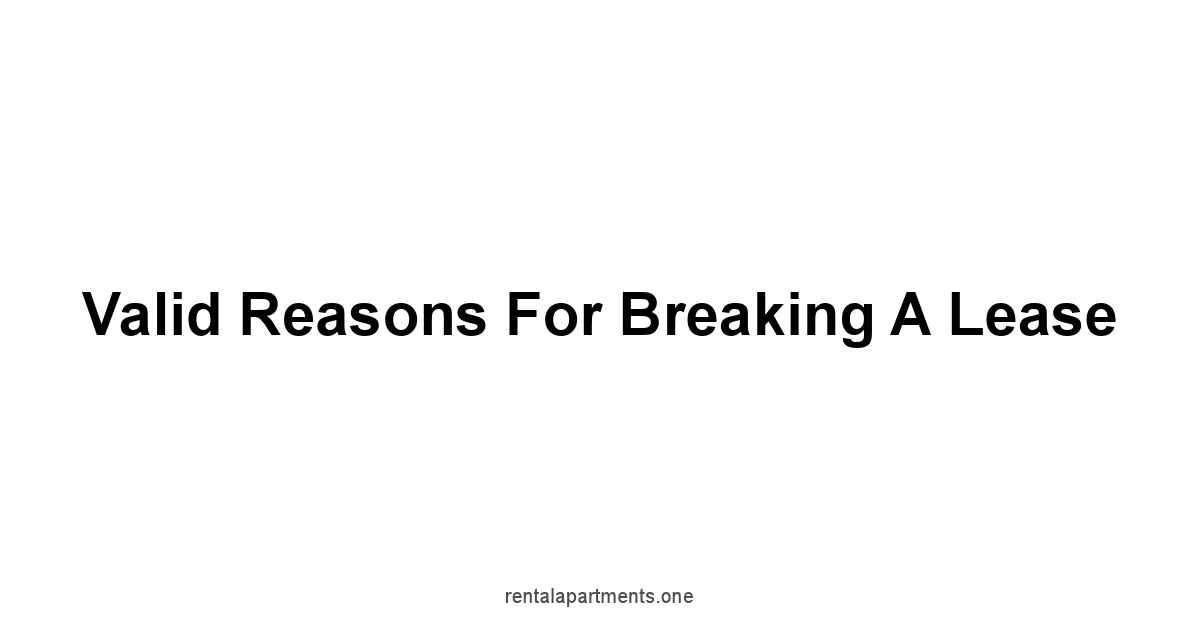
Sometimes, life throws a curveball, and staying in your lease becomes impossible.
There are valid reasons, legally and ethically, that allow you to break your lease without severe penalties.
These situations often involve circumstances beyond your control that make it unreasonable or unsafe for you to continue the lease.
Recognizing these valid reasons is crucial before you decide to take the step to move out.
Understanding your rights as a tenant can shield you from unnecessary financial hardship and legal issues.
You’re not trapped, there are legitimate outs, and these reasons aren’t always obvious.
So, be informed, be aware of the circumstances that protect you when you have to break a lease.
Military Deployment or Permanent Change of Station
If you’re in the military, a deployment or a permanent change of station PCS can give you a legitimate reason to terminate your lease.
The Servicemembers Civil Relief Act SCRA protects active-duty military personnel from lease liabilities when they receive orders for a period of 90 days or more.
This federal law requires that your landlord let you out of your lease with no penalty after providing a copy of your military orders and written notice.
The protection is not automatic, you need to follow the correct procedure.
This includes providing your landlord with a copy of your official orders and a written notice to terminate the lease.
These documents should clearly state the reason for the termination, the date your orders are effective, and when you plan to vacate the property.
It’s not just a get-out-of-jail-free card, you’ve got to follow the rules.
- SCRA Protection: Provides legal protection for military personnel on active duty.
- Deployment Orders: Must be for a period of 90 days or more.
- PCS Orders: Requires a permanent relocation to a different duty station.
- Written Notice: You must provide a written notice to the landlord, along with your orders.
- Official Orders: A copy of your military orders is required to terminate the lease without penalty.
- Proper Procedure: Follow the correct procedure to avoid penalties under SCRA
Uninhabitable Living Conditions
Leases are a deal for both sides, you have to pay rent, but the landlord has to keep the property in habitable condition.
If your property becomes uninhabitable, due to issues beyond your control, it can be a valid reason for breaking your lease.
Uninhabitable conditions may include serious health and safety issues that make it unsafe or uncomfortable for you to live in the space, that the landlord fails to address promptly.
Examples of uninhabitable living conditions include serious mold infestations, structural issues with the building, persistent lack of essential services like water, electricity, or heat, infestations of pests such as rats or cockroaches, or dangerous conditions that violate local health and safety codes. This doesn’t cover normal wear and tear. The issues must be substantial.
And, you need to document it, take pictures and keep records of your communication with the landlord.
| Issue | Description |
|---|---|
| Structural Damage | Leaking roof, unstable walls, foundation issues |
| Mold Infestation | Severe mold growth affecting health and air quality |
| Pest Infestation | Rats, cockroaches, or other pests making the space unsanitary |
| Lack of Utilities | No water, electricity, or heat for extended periods |
| Safety Violations | Exposed wires, non-functioning smoke detectors |
| Code Violations | Breaching local housing codes for safety, health and habitability |
Domestic Violence Situations
Domestic violence is a serious issue, and in many jurisdictions, it gives you the right to terminate your lease early without penalty.
Many states have laws that protect victims of domestic violence, allowing them to break their lease without financial repercussions if they can provide proof of the abuse.
These laws recognize that victims need to move to a safe place, and they shouldn’t be held hostage by a lease agreement.
To invoke this protection, you often need to provide official documentation of the abuse.
This could include a police report, a protective order, or a statement from a qualified professional, such as a therapist or social worker.
The exact requirements will depend on your local and state laws.
This protection is in place to help, to provide a path out of a dangerous situation, so don’t hesitate to seek the help you need and exercise your rights.
- Legal Protections: Many states offer specific legal protections for victims of domestic violence.
- Proof of Abuse: Requires documents like a police report, protective order, or statement from a professional.
- Confidentiality: Laws often protect your confidentiality and personal safety.
- Immediate Safety: Allows immediate relocation without severe financial penalties.
- Victim Assistance: Access to victim assistance programs is often provided.
- Local Laws: Specific requirements vary by state and local jurisdiction.
Landlord Violations of Lease Terms
A lease is a two-way street, you have obligations, and so does your landlord.
If your landlord violates the terms of your lease, it can be a valid reason to break the lease.
This isn’t about minor inconveniences, it has to be serious and persistent breaches of the contract that impact your right to a quiet and safe space.
Landlord violations can vary from state to state but are generally the ones that make the unit unlivable or unsafe for the renter.
These violations can include a failure to make necessary repairs, illegal entry into the apartment without proper notice, or failure to address dangerous conditions.
This also includes the landlord neglecting to provide services promised in the contract or being discriminatory towards the tenant in some form.
Keep a detailed record of all the landlord’s violations, including when they occurred and all your correspondence regarding these issues. It’s about holding your landlord accountable.
| Violation | Description |
|---|---|
| Failure to Repair | Neglecting to fix significant issues such as leaks, appliance issues, pest control. |
| Illegal Entry | Entering without proper notice or a valid reason |
| Unsafe Conditions | Neglecting to address safety concerns like non-working locks or smoke detectors |
| Lease Violations | Breach of explicit terms of the lease regarding amenities or maintenance |
| Harassment | Illegal and constant harassment of the tenant |
| Discrimination | Discriminating based on race, religion, gender, or other protected groups |
Negotiating a Lease Termination with Your Landlord
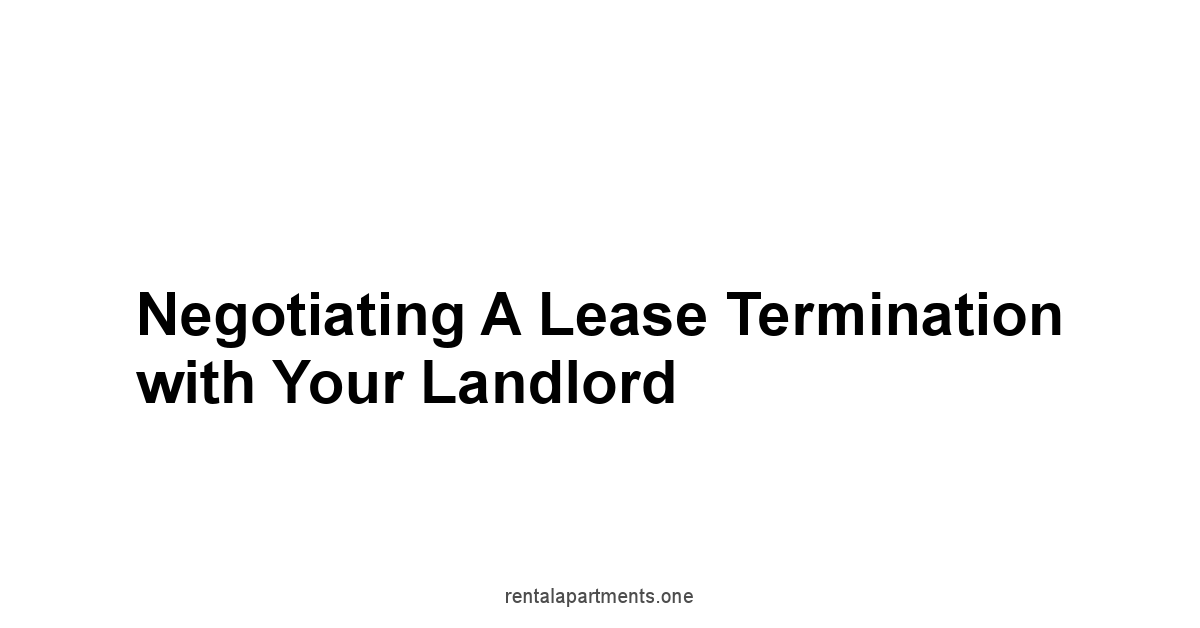
Breaking a lease isn’t always about ending the contract abruptly and facing the consequences.
Often, the best approach involves negotiation with your landlord.
Open, honest communication, and a bit of compromise can lead to a resolution that works for both sides.
It’s about finding common ground instead of digging in your heels.
Negotiation isn’t a sign of weakness, it’s a sign of maturity.
It’s about talking through the problem with your landlord, presenting a fair plan, and coming to an agreement that doesn’t leave anyone bitter or financially ruined.
You might be surprised what you can achieve with a calm, collected approach and a willingness to work together.
Open and Honest Communication
Start by talking to your landlord.
Explain your situation clearly and honestly, why you need to break your lease, and listen to what they have to say.
The best thing is to not be aggressive or defensive.
It’s always better to approach the conversation with respect and a willingness to find a solution that can work for both of you.
Don’t make any threats or accusations, it’s about finding a common ground.
When communicating, be clear about what you are hoping to achieve.
Do you want to get out of the lease entirely or come to an agreement about a compromise? Be ready to listen to your landlord’s perspective, they have financial obligations as well.
It’s about presenting your case, listening to theirs, and looking for ways to meet in the middle.
- Be Direct: Clearly explain your reasons for wanting to break the lease.
- Be Respectful: Maintain a courteous and professional tone.
- Listen: Pay attention to the landlord’s concerns and perspective.
- Be Honest: Avoid making excuses or exaggerating your reasons.
- Stay Calm: Keep emotions in check during discussions.
- Be Empathetic Consider the financial impact for the landlord
- Document: Keep records of all communication with the landlord.

Offering a Lease Buyout
One option to propose is a lease buyout.
This involves offering a lump sum to the landlord to compensate them for the early termination of your contract.
The amount can vary, but it’s usually a portion of the rent you owe or a flat fee.
It’s essentially a way to buy your way out of the lease and a way to compensate the landlord for the potential loss of rental income.
When calculating the amount for a buyout, think about the remaining months on your lease, and what would be reasonable in your specific situation.
You might offer to pay for one or two months rent, or a smaller lump sum.
The key is to make an offer that is fair and attractive to the landlord.
It should show that you’re serious and that you want to end the lease responsibly.
| Aspect | Considerations |
|---|---|
| Lump Sum Payment | Offer a fixed amount to end the lease early |
| Partial Rent | Pay a certain number of months of rent that remain on your lease |
| Negotiation | Be prepared to discuss the amount with your landlord |
| Fair Offer | Propose an amount that is fair and reasonable to all parties |
| Documentation | Get the agreement in writing for legal protection |
| Payment Method | Ensure you are paying through the method defined in the lease contract |
Finding a Suitable Replacement Tenant
Another way to reduce the financial impact of breaking your lease is to help your landlord find a replacement tenant.
This means taking an active role in finding someone to take over the lease, showing the apartment, and screening potential tenants.
If you can find a good tenant who is willing and able to assume the remaining lease, it can solve your problem as well as minimize the financial burden for your landlord.
Offer to list the property on online rental platforms, screen candidates, and handle showings.
Present your landlord with a few qualified tenants, and let them make the final decision.
It shows that you are making an effort to take responsibility for your situation.
Make sure that your landlord is comfortable with the process, this is about collaboration and not about taking control.
- Active Role: Actively search for potential tenants.
- Advertising: List the property on rental websites.
- Screening: Conduct background checks and reference checks.
- Showings: Arrange viewings of the apartment for potential tenants.
- Qualified Applicants: Present your landlord with a list of suitable replacement tenants.
- Landlord Approval Let the landlord make the decision about the new tenant and sign the lease.
Documenting All Agreements
Whatever agreement you reach with your landlord, make sure to get it in writing.
A verbal agreement is not enough and could lead to misunderstandings or problems later.
Once you have agreed to something, document it in writing. This protects both you and your landlord.
A written agreement provides proof of the terms you both agreed to.
Make sure the written agreement includes the details of the lease termination, what is expected of you and of your landlord, how much you paid, the date that you will be vacating, and all other agreed upon items.
Have the agreement signed by all parties involved to make it legally binding and secure proof of your deal. This is the best way to avoid future disputes.
| Step | Description |
|---|---|
| Written Terms | Put all agreements in writing, not just verbally agreed. |
| Specific Details | Outline all terms, conditions, amounts, and dates in the document |
| Signed by Parties | Ensure all involved parties have signed and dated the written agreement |
| Copies | Have a copy of the agreement for each party involved |
| Legal Review | Have a legal professional review the document if needed |
| Follow Through | Make sure each party follows the agreed terms of the agreement |
The Financial Implications of Breaking a Lease
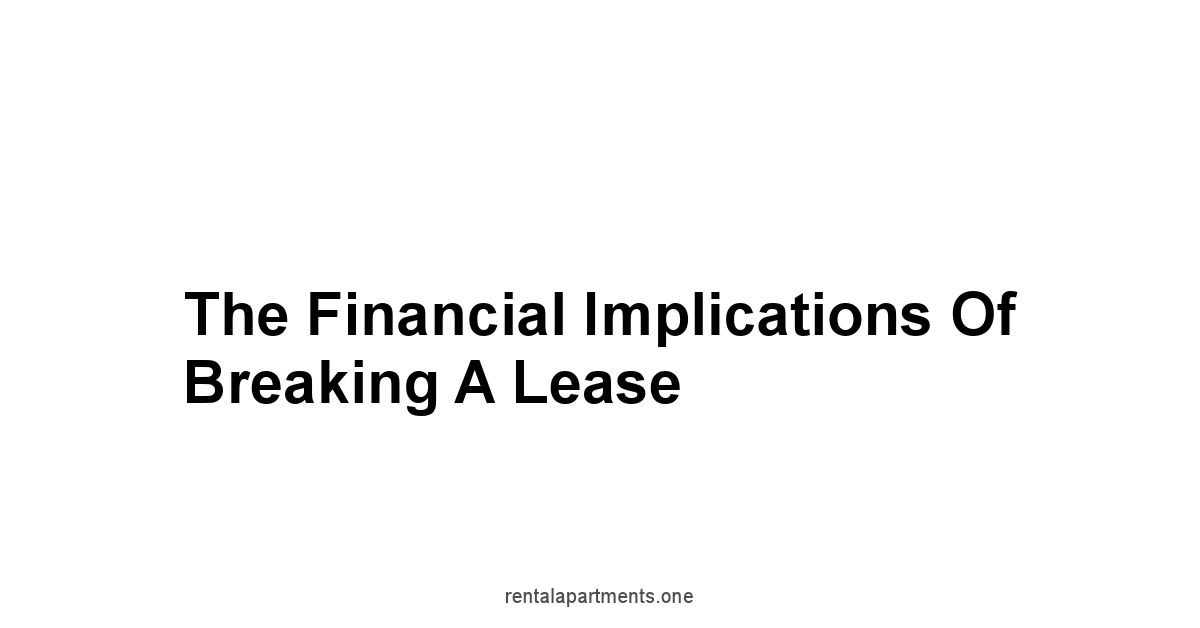
Breaking a lease is not always a simple matter, it can have significant financial consequences if you don’t handle it correctly.
It’s essential to be aware of the potential costs involved, from losing your security deposit, to paying early termination fees or even facing legal battles.
Understanding these financial risks can help you make informed decisions and prepare for the consequences of breaking a lease early.
Breaking a lease isn’t just about moving out, it’s about the potential financial burden you might incur.
Ignoring these implications can lead to serious debt, damage to your credit, and even legal complications that can affect your future.
So, make sure you understand the costs involved and that you have considered these issues before making the decision to leave your place.
Security Deposit Forfeiture
One of the most immediate financial impacts of breaking a lease is the potential loss of your security deposit.
Your deposit is there to cover any damages, and if you break the lease, your landlord might keep it to cover losses due to you vacating early.
This doesn’t automatically mean you’ll lose the entire amount, but it’s a real possibility.
Even if the property isn’t damaged, your landlord can use all or a part of the deposit to cover lost rent for the time your property is vacant.
It’s essential to understand the terms of your lease regarding security deposits, and to leave the property in good condition.
You want to mitigate any additional damage that can justify your landlord keeping your entire deposit.
- Potential Loss: Breaking the lease can result in forfeiture of the security deposit.
- Covering Damages: Landlords can use the deposit to cover damage beyond normal wear and tear.
- Unpaid Rent: The deposit may be used to cover unpaid rent due to early termination.
- Lease Terms: Review your lease for specific rules about security deposits.
- Property Condition: Leaving the property in good condition can minimize deductions.
- Documentation: Document the condition of the property at move-in and move-out.
Rent Payments and Obligations
When you break a lease, you are still potentially responsible for rent payments until the end of the contract.
If your landlord is not able to find a new tenant, they will expect that you cover your rent until they find a new tenant or until your lease ends. This is a serious obligation.
Even if you move out, you will still be legally and financially liable for the rent.
Your lease is a legally binding contract, and unless there is a legal reason for you to terminate it without consequences, you will be responsible for those payments.
Be aware of your obligations, they don’t end when you leave the apartment.
- Contractual Obligation: You are legally obligated to pay rent for the duration of your lease.
- Liability: Landlords can pursue you for unpaid rent if you move out early.
- Remaining Term: You might be responsible for the rent until the end of the contract.
- Mitigation: Landlords are sometimes required to try and mitigate their loss by finding a new tenant.
- Written Agreement When an agreement is met, it needs to be in writing.
- Financial Planning: Prepare for the possibility of continued rent payments.
Early Termination Fees
Many leases include an early termination fee clause that specifies a fee you must pay if you break your lease.
This fee could be a flat sum, equivalent to a couple of months of rent, or some other calculation.
It is a way for the landlord to cover their costs, and for them to be compensated for the early vacancy.
These fees are often designed to make breaking your lease financially difficult and discourage early termination.
The amount can be substantial, so it’s critical to review your lease carefully and understand how these fees might apply to your specific situation.
This is why you need to know your lease inside and out.
- Contractual Penalty: Fees are specified in many lease agreements.
- Set Amount: Often a pre-determined sum or number of rent payments.
- Purpose: To compensate the landlord for the cost of finding a new tenant.
- Negotiation: Early termination fees might be negotiable.
- Legal Requirements: Some jurisdictions may have limits on these fees.
- Review Lease Carefully: Understand the terms and conditions regarding the fees.
Credit Score Impact
Breaking a lease can potentially affect your credit score if your landlord decides to report the debt to credit bureaus.
Unpaid rent or fees, or other obligations, can be reported to credit agencies, which can lower your credit score and make it more difficult to rent an apartment in the future.
Landlords also report debt to collections agencies, which can impact your credit negatively.
This negative impact on your credit score can make it difficult to rent another apartment and can affect your ability to get a loan or credit card, or other types of credit.
Protecting your credit score is important, so it’s essential to address your lease obligations carefully and responsibly.
Always try to negotiate with your landlord before it goes to collections.
- Credit Reporting: Landlords can report unpaid rent or fees to credit bureaus.
- Negative Impact: Can lower your credit score, affecting your future applications.
- Difficulty Renting: Makes it harder to find future housing due to credit concerns.
- Future Credit: May affect your ability to get credit for loans or credit cards.
- Collections Unpaid debt can be sold to a collections agency.
- Negotiation Try to work with your landlord to avoid credit bureau reporting.
Legal Fees and Court Costs
If you and your landlord can’t come to an agreement, the situation could escalate to legal action.
If your landlord sues you for breaking the lease, you will have to pay legal fees and other court costs.
These costs can add up quickly, and they can be expensive.
Lawsuits can be time-consuming, stressful, and costly, even if you are in the right.
The cost of legal fees, court filing fees, and other expenses can put a huge financial burden on you and could be avoided if you try to negotiate a settlement with your landlord.
Make sure you understand that legal options are expensive and they should be used as a last resort.
- Potential Lawsuit: Landlords can pursue legal action for unpaid rent or breach of contract.
- Legal Costs: Can include attorney fees, court filing fees, and other expenses.
- Time-Consuming: Legal battles can be lengthy and stressful.
- Unpredictable Outcomes: Court results are not always guaranteed.
- Financial Strain: Legal action can create significant financial burdens.
- Mediation: Explore mediation and negotiation to avoid legal costs.
Legal Rights and Protections for Tenants
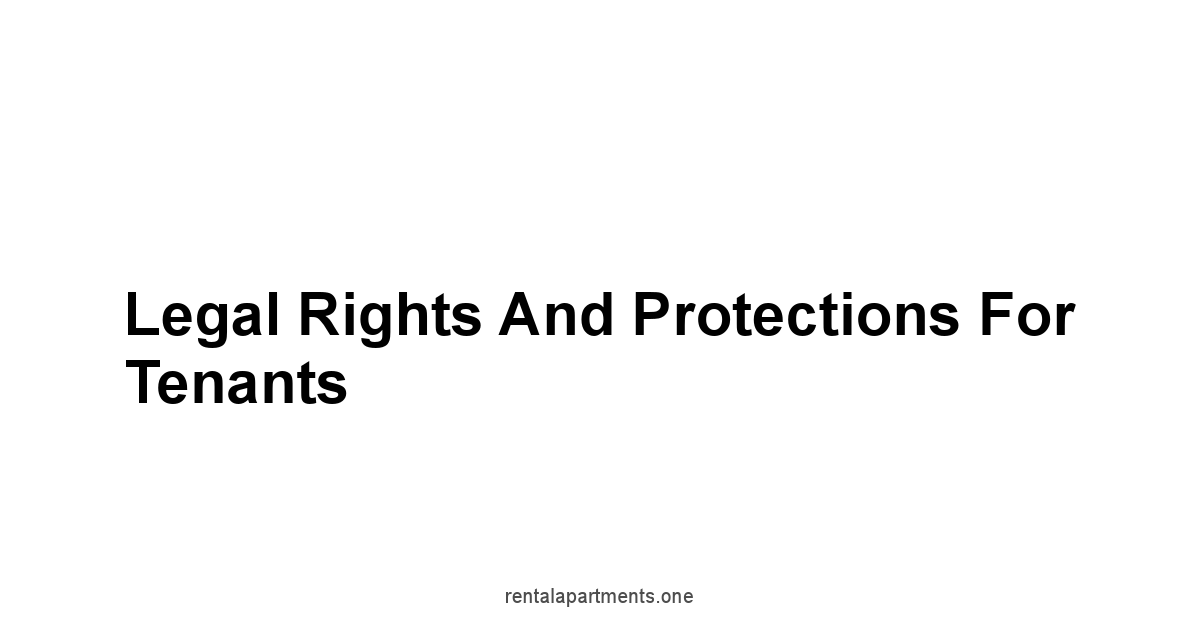
Tenants are not without rights.
Understanding the legal protections available is crucial when you are faced with a situation where you have to break your lease or deal with issues regarding your tenancy.
These protections are designed to ensure fair treatment of tenants and to provide recourse when landlords don’t follow the rules.
Knowing your rights empowers you and helps you protect yourself.
Tenant laws are complex, they vary by state and jurisdiction and it’s critical that you know your legal rights.
Familiarizing yourself with these regulations helps you navigate the tricky situations you might face when dealing with landlords, and it can help you avoid disputes and protect your rights.
State and Local Tenant Laws
Every state, and often every city or county, has its own unique set of laws that govern the relationship between landlords and tenants.
These laws vary significantly, covering many aspects of the tenancy, from security deposits, to leases, to evictions.
These rules define the rights and obligations of both the landlord and the tenant, and they are there to protect you.
It’s crucial to research the laws in your specific location.
Look for resources available in your community, it could be local tenant advocacy groups or resources offered by your local government.
Understanding these local and state rules and regulations can make a big difference if you run into trouble.
Ignorance is not bliss when it comes to tenant law, knowing the rules can be the key to finding a resolution.
- State Laws: Each state has different laws governing landlord-tenant relations.
- Local Ordinances: Cities and counties often have additional regulations.
- Rent Control: Some areas have rent control laws to protect tenants from increases.
- Security Deposit Rules: State-specific rules about handling, returning, and deducting security deposits.
- Eviction Regulations: Procedures that landlords have to follow for lawful evictions.
- Tenant Rights: Varying rights regarding privacy, repairs, and habitability.
Fair Housing Act Regulations
The Fair Housing Act is a federal law, and it protects tenants from discrimination based on several factors, such as race, color, religion, national origin, sex, familial status, and disability.
This act ensures that all tenants have equal access to housing and protects them from discriminatory practices by landlords.
The Fair Housing Act applies throughout the United States.
This act prohibits landlords from denying housing, setting different terms or conditions, or providing different services based on the protected characteristics mentioned above.
Any landlord who violates the FHA may face penalties such as fines and other court fees.
Be aware of your rights, the Fair Housing Act is a tool you can use to protect yourself.
- Federal Law: The Fair Housing Act is a federal law that applies across the U.S.
- Protected Classes: Prohibits discrimination based on race, religion, gender, disability, etc.
- Equal Access: Guarantees equal opportunities in housing for all tenants.
- Prohibited Practices: Includes denying housing, setting different terms, and harassment.
- Enforcement: Complaints can be filed with HUD or other relevant agencies.
- Legal Action: Victims of discrimination can pursue legal action.
Eviction Laws and Processes
If a landlord wants to evict you from the premises, they must follow certain legal procedures.
Evictions are legal processes, and they can’t happen without due process, regardless of the reasons.
Knowing your rights in an eviction situation can help you defend yourself and prevent you from being evicted unfairly.
These laws specify the grounds for eviction, proper notice requirements, and the legal steps your landlord must take to remove you from the property. It’s about understanding the formal process.
If you are being evicted, make sure you are aware of the proper eviction process and make sure that the landlord has followed the law.
Don’t just pack up and leave because you receive notice.
- Legal Process: Landlords must follow specific legal procedures for evictions.
- Grounds for Eviction: Requires a valid reason, such as unpaid rent or lease violations.
- Notice Requirements: Landlords must provide proper written notice of eviction.
- Court Involvement: Evictions often require a court order.
- Tenant Rights: You have the right to defend yourself in eviction court.
- Illegal Eviction: Unlawful evictions can result in penalties for the landlord.
When to Seek Legal Counsel
When faced with a lease issue, consider seeking advice from a legal professional, especially if you are facing a difficult situation.
Legal counsel can help you understand your rights, review your lease and documents, and guide you through the process of breaking the lease.
Lawyers are not cheap but they can provide advice and representation that can prevent you from making a mistake.
An attorney can help you navigate the legal aspects of your situation, advise you on how to proceed, and defend you against legal action.
If you’re facing serious consequences, it’s often a smart idea to consult with a lawyer.
It’s better to be safe than sorry, and a lawyer can give you piece of mind.
- Complex Issues: Seek counsel for complex or unique lease issues.
- Lease Review: An attorney can review your lease and explain your obligations.
- Legal Advice: Provides specific guidance based on your situation.
- Representation: An attorney can represent you in court if needed.
- Negotiation: Legal counsel can help you negotiate with your landlord.
- Protection: Protect your rights and avoid legal pitfalls.
Subleasing Your Apartment
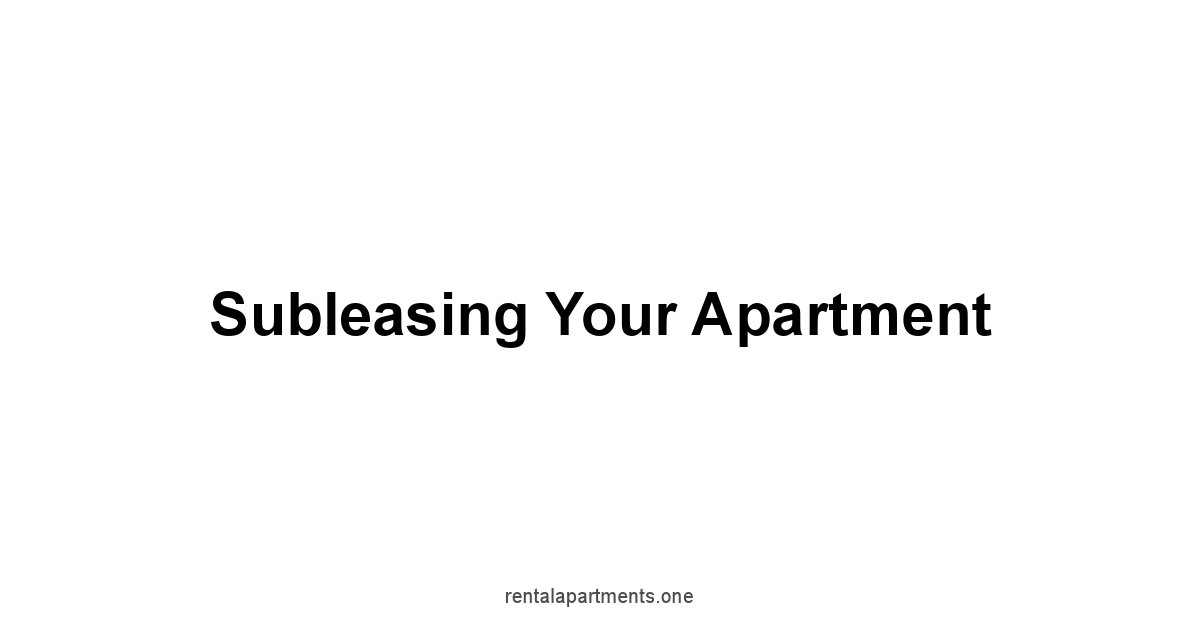
Subleasing your apartment can be a viable option when you have to move out before the lease ends and you are not able to end it without consequences.
Subleasing means you are renting out your place to someone else for a period of time, while you are still responsible for the original lease.
This allows you to recover a portion of the rent that you will owe, while fulfilling your obligations under the original lease agreement.
Subleasing isn’t a simple fix, it comes with responsibilities and requirements.
It’s essential to understand what subleasing entails, and the requirements you need to meet.
The best way to think about it is that you will become a mini-landlord and you will have to make sure you select a good subtenant that will not break the rules.
What is Subleasing?
Subleasing is when you, as the original tenant, rent your apartment to another person, known as a subtenant.
You become the middleman between your landlord and the new tenant.
You’re still responsible for fulfilling your original lease agreement, which includes ensuring rent is paid and the property is in good condition.
This means you are still financially responsible for any damages caused by the subtenant.
Subleasing can be a good temporary solution for you to move without totally breaking your lease, especially if your lease has a subletting clause that allows you to do this.
Just remember that even though the subtenant is living there, you are still the one who is responsible for all aspects of the original lease agreement.
- Tenant-Subtenant Relationship: You are the original tenant, renting to a subtenant.
- Original Lease Remains: You remain responsible under the original lease agreement.
- Rent Collection: You collect rent from the subtenant and pay your landlord.
- Responsibility for Damages: You are responsible for any damages caused by the subtenant.
- Temporary Solution: Subleasing is often a temporary arrangement.
- Landlord Approval: Typically requires permission from the landlord.
Landlord Approval and Requirements
Most leases require you to obtain your landlord’s consent before you can sublease your apartment.
Landlords usually want to make sure that the subtenant is reliable and that they will not cause any problems.
Before you start to sublease, read the lease carefully and understand the process that your landlord requires.
The requirements for landlord approval can vary from a simple form, to a formal background check and an interview with the subtenant.
They may have specific requirements for the subtenant, and they may even require that they sign a new lease.
Comply with your landlord’s requirements and make sure you get their agreement in writing. This is very important.
- Lease Review: Check your lease to see if subleasing is allowed.
- Consent Required: Landlord approval is usually required for a sublease.
- Application Process: The landlord might require a formal application.
- Background Checks: Landlords may require screening of the potential subtenant.
- New Lease: A new agreement may need to be drafted.
- Written Permission: Ensure that you get written permission from your landlord.
Responsibilities of the Original Tenant
As the original tenant, you remain responsible for ensuring that rent is paid on time and that the property is well maintained, even when it’s being occupied by your subtenant.
If the subtenant fails to pay rent or causes any damage to the property, you are ultimately responsible to the landlord.
Subleasing does not relieve you of your obligations under the original lease agreement.
You are essentially a landlord to your subtenant, and you must resolve any issues, including late rent payments, damage to the property, or any violations of the lease terms.
If you don’t uphold your responsibilities, your landlord may hold you accountable, and they can even start eviction procedures if the subtenant causes severe issues.
- Rent Payment: You are responsible for paying the rent to your landlord.
- Lease Terms: You must ensure the subtenant follows the original lease terms.
- Property Maintenance: You are responsible for ensuring the apartment is maintained.
- Issue Resolution: You must address any problems with your subtenant or the property.
- Landlord Liability: You are still liable to your landlord for anything that happens in the apartment.
- Tenant Rights: Be aware of tenant rights, and make sure the subtenant is aware of them as well.
Screening a Potential Subtenant
Thoroughly screening a potential subtenant is important to protect yourself and your landlord.
Do all the required due diligence to ensure you are selecting someone who is responsible and can meet their obligations under the sublease agreement.
This can include doing a background check, checking credit history, and verifying employment, as well as contacting previous landlords.
Treat this process as if you were the landlord.
Verify their information, interview them, and only select someone who makes you feel safe.
Check for red flags such as a bad credit score, an eviction history, or any history of trouble with previous landlords.
Taking your time to find the right person can protect you.
| Aspect | Screening Actions |
|---|---|
| Application | Require a formal application with accurate personal information |
| Background Check | Conduct criminal background checks through a reliable provider |
| Credit Report | Check their credit history for any signs of financial irresponsibility |
| Employment Verification | Confirm their employment status and income stability |
| Reference Checks | Contact previous landlords for references |
| Personal Interview | Interview the potential subtenant to assess their suitability |
Alternatives to Breaking a Lease
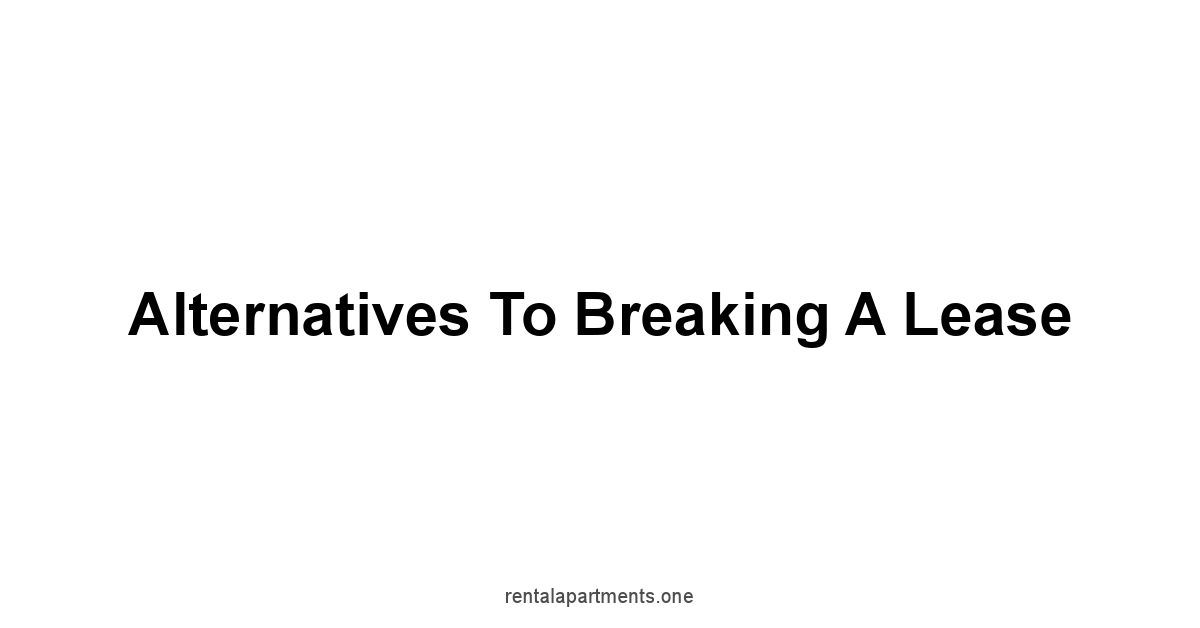
When you’re considering breaking your lease, it’s worth exploring alternatives before resorting to a termination.
These options may allow you to move out early without incurring significant financial penalties and without hurting your credit or your record with your landlord.
There are solutions, but it’s important to approach them with a proactive and collaborative mindset.
There are alternatives to breaking a lease, you can think of them as ways to transfer your responsibilities to someone else, or a form of early termination that is more amicable than just leaving and dealing with consequences after.
Think about these options, because they can be better solutions than facing the consequences of a straight break.
Negotiating a Lease Transfer
One alternative is to negotiate a lease transfer with your landlord.
This involves finding a new tenant who is willing to take over your lease agreement, under the same terms and conditions.
This transfers the obligation from your side to the new tenant.
If your landlord agrees, the new tenant steps into your shoes and you’re no longer responsible.
This option can require you to do some work, you might have to advertise the availability of the property, screen potential tenants, and work with your landlord to complete the transfer.
It requires your landlord’s cooperation and you will need to be flexible.
But it can be a good way to avoid some of the major penalties of an early termination.
- New Tenant: Finding someone to take over your existing lease.
- Same Terms: The new tenant agrees to the original lease agreement.
- Landlord Approval: Requires the landlord’s consent to the transfer.
- Screening Process: You may be involved in screening potential tenants.
- Release of Liability: Upon successful transfer, your liability is released.
- Negotiate:
Final Verdict
Navigating the complexities of a lease agreement can feel like charting unknown waters, but understanding your options when life circumstances shift is crucial.
Remember, the lease is a contract, but it’s not an unbreakable chain.
You’ve learned about the valid reasons for early termination, including military orders, uninhabitable conditions, and domestic violence situations, these are your lifelines when circumstances take a turn.
The key is to understand your situation, know your rights, and be ready to communicate openly and honestly with your landlord. You’re not alone in this.
Don’t forget the power of negotiation.
A conversation with your landlord can be more productive than you might think.
Offering a buyout, finding a replacement tenant, or even a lease transfer can smooth the path to a resolution.
It’s about finding that common ground, not seeing this as an all out fight with no winners, and it’s about protecting yourself.
Remember, it’s not just about ending the lease, it’s about doing it responsibly, and in a way that is financially sound.
The financial implications are real, but they’re not insurmountable.
You’ve seen how security deposits, rent obligations, early termination fees, and credit score impacts can affect you, and how legal fees can add to the burden.
So be informed, be proactive, and be ready to communicate with your landlord with respect.
Be aware of your rights and responsibilities, and know when to ask for help.
Knowing your options, from subleasing to negotiating a lease transfer, will help you make decisions that are right for you and your specific situation. You’re not cornered, there’s always a path.
Ultimately, breaking a lease is a decision that requires careful consideration of all the angles.
From thoroughly understanding the clauses of your lease, to understanding tenant rights, and exploring viable alternatives. You are more empowered with knowledge.
The path might not be easy, but with the right approach, open communication, and a willingness to find a solution, you can navigate this challenging situation successfully.
You’ve got this, so take a deep breath, review your options, and take that next step with confidence.
Frequently Asked Questions
What should I do before considering breaking my lease?
First, read your lease, every single line.
Know your obligations, your rights, and every detail.
It’s a binding contract, and you need to know it well, before you make any decisions about breaking it.
What are some key clauses to look for in my lease?
Pay attention to the early termination clause, it will tell you what you have to pay to leave early.
Check the subletting clause, does the lease allow subletting? Look for the rules about your security deposit and the conditions under which it can be withheld. And, of course, don’t forget about the fine print.
What is the Servicemembers Civil Relief Act SCRA?
The SCRA protects military personnel.
If you’re active-duty military and receive orders for a period of 90 days or more, you can terminate your lease without penalty.
You have to provide a copy of your orders and written notice to the landlord.
What are some examples of uninhabitable living conditions?
Serious mold, structural damage to the building, a persistent lack of essential services like water or electricity, or infestations like rats or cockroaches.
These issues have to be serious and not the result of normal wear and tear.
And, you need to document these problems with pictures and keep a record of your communications with the landlord.
Can I break my lease due to domestic violence?
Many states have laws that protect victims of domestic violence.
If you can provide official documentation of the abuse, like a police report or a protective order, you can usually break your lease without penalties.
What should I do when negotiating with my landlord?
Be direct, respectful and stay calm.
Explain your situation clearly and listen to what the landlord has to say.
Don’t make threats or accusations, be ready to listen to their point of view, and look for ways to find a solution.
What is a lease buyout?
A lease buyout is when you offer your landlord a lump sum of money to compensate them for the early termination of your lease.
This is an offer you propose to them, as a way to get out of the lease.
How can I help my landlord find a replacement tenant?
Help advertise the property, screen potential tenants, and arrange apartment showings.
Present your landlord with a few qualified candidates.
It’s about showing you’re taking responsibility for your situation.
Why is it important to document all agreements with my landlord?
A verbal agreement is not enough.
Any agreement needs to be in writing, detailing all terms and conditions, and signed by both parties.
This is the best way to avoid future problems and misunderstandings.
What happens to my security deposit if I break my lease?
You may lose your security deposit, the landlord can use that money to cover losses due to you vacating early.
They can also deduct from your deposit any damages to the property beyond normal wear and tear.
Am I still responsible for rent if I break my lease?
Yes, you can still be liable for the rent until the end of the contract or until the landlord finds a new tenant, unless there is a valid legal reason that protects you.
What are early termination fees?
Early termination fees are a sum of money that the landlord charges you when you break the lease.
They are usually a fixed amount stated in your contract that you have to pay in order to leave before the end date.
How can breaking a lease impact my credit score?
If you don’t pay the rent, late fees or other obligations, your landlord can report you to credit bureaus, which can lower your credit score.
Make sure you address your lease obligations carefully.
When should I seek legal counsel?
If you face complex issues, or when you are dealing with a difficult situation with your landlord.
A lawyer can help you understand your rights and obligations, review your lease, and guide you through the legal process.
What is subleasing?
Subleasing is when you rent your apartment to someone else for a period of time, while you are still responsible for the original lease.
What are my responsibilities as the original tenant when subleasing?
You are still responsible for paying the rent to your landlord, ensuring the property is maintained, and making sure that the subtenant follows the terms of your original lease.
What should I do when screening a potential subtenant?
Do a background check, check their credit history, verify their employment, and contact previous landlords. Make sure that this person is reliable.
What is a lease transfer?
A lease transfer is when you find someone to take over your lease agreement under the same conditions.
The new tenant steps into your shoes, and you’re no longer responsible.
Is it better to try an alternative to breaking my lease?
Yes, alternatives are a better option, they may allow you to move out without penalties.
You can try to negotiate with your landlord or transfer your lease to another person.




